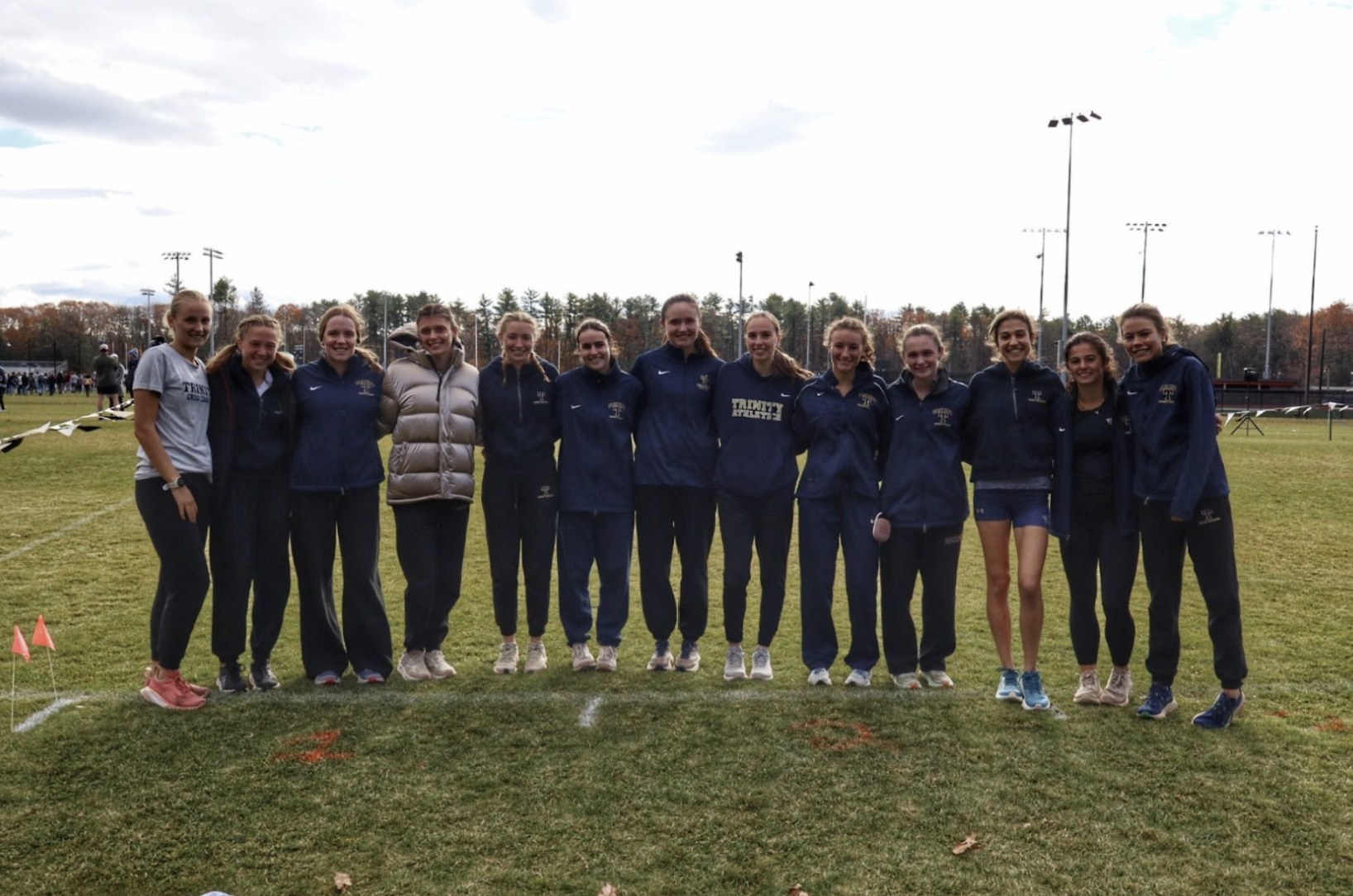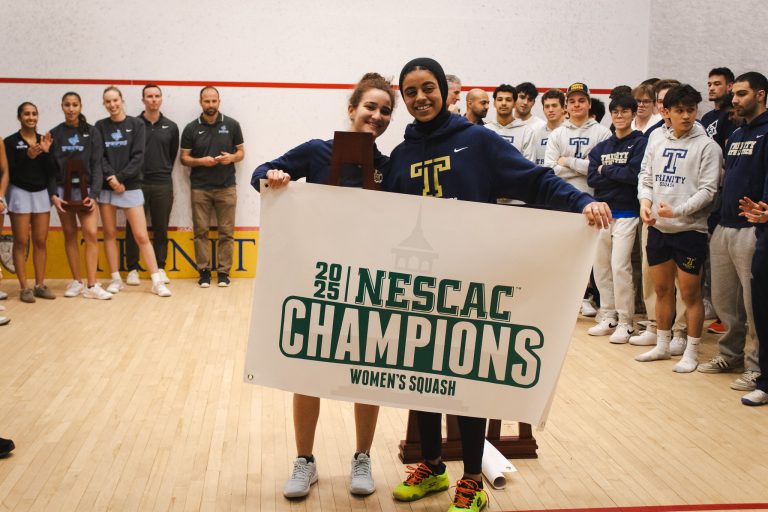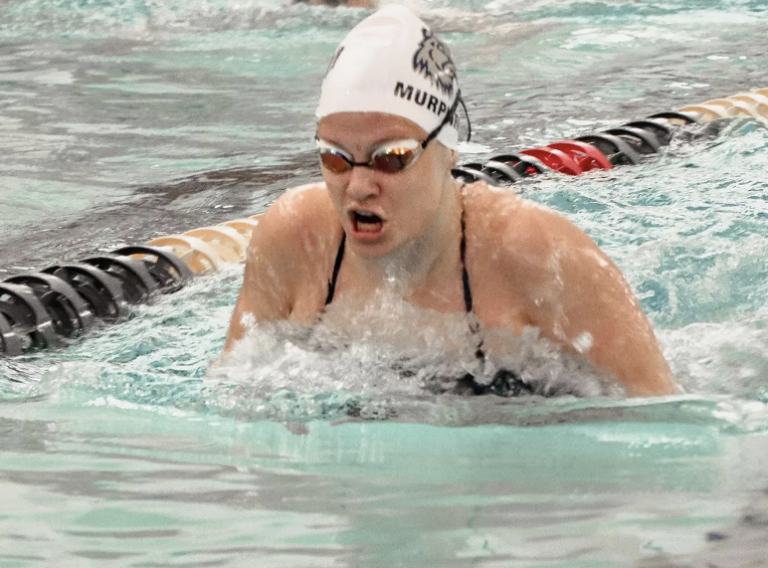Annika Dyczkowski ’25
Executive Sports Editor
This past Saturday, November 2, Trinity Women’s Cross Country took a road trip to Brunswick, ME, to compete in the NESCAC Championship. The Tripod discusses the team’s performance, culture, dynamics and preparation for regionals in-depth with captains Vivian Jacobs-Townsley ’25 and Maggie Furer ’26.
Jacobs-Townsley is a two-time captain of her team and has been the loyal member of a cross country team since middle school. An English major, SAAC and Hillel House member, Jacobs-Townsley is from Amherst, MA. This past weekend, she set a personal record (PR) of 23:23, placing fifth out of all competing Bantams.
“Almost everyone PR-ed and almost everyone PR-ed on the season,” Jacobs-Townsley stated. She elaborated, saying that the landscape of the course assisted the team in achieving outstanding individual successes. “The course is really flat. Most courses are either really technical or really hilly.” She concluded, “Bowdoin also did a really good job of preparing the course.”
Furer, a Neuroscience major, added that hard work was still the deciding factor in Saturday’s results, regardless of the terrain. “We’ve put in the most solid training that anyone on this team has had yet.” Jacobs-Townsley added, “Culturally, this [season] has been the most everyone has been invested in the training to such a high degree of taking it seriously.” Furer continued, expressing the same sentiment, “I think we were set up by the course to PR, but I also think that on a lot of courses we would have had the same result.”
The Bantams have set the bar high relative to past seasons, which both Captains attribute to a mindset and team culture shift. “Running is weird, because at the end of the day it’s kind of a solo sport. There’s a thing on cross country teams where people can just kind of mind their business and then just show up on race day and hope it all comes together, but that’s not what our team does,” Jacobs-Townsley stated. Furer attributed the culture shift to a learning curve, acknowledging that final scores are reflective of the entire team’s performance and reaffirming that cross country is a team sport. “We’ve learned to do it for each other, because you can’t do it by yourself.”
The Captains elaborated on the team mindset shift. “We try to emphasize that it’s not really cool on our team to not try,” stated Jacobs-Townsley. As a leader, she finds it most important to find stability within the sport to keep everyone motivated. “It’s something that we all signed up to do, but it’s also a matter of finding the balance between the ‘fun’ and the ‘grind’,” she emphasized. “Also with running, everything you’re doing is done for a reason,” said Furer. “What you’re putting in at practice every single day is how you get faster and there’s a really direct input to output.” Jacobs-Townsley adds, “The training science works.”
Showing up and routinely putting in the work is easy when you are doing it with your friends, they agreed. “I feel like [practice] is just showing up to your group of friends,” said Jacobs-Townsley.
The Bantams will soon compete in the NCAA Mideast Regional on Saturday, November 16. Head Coach John Michael Mason believes that the team’s performance at the NESCAC Championship puts them in a good position for the regional meet, as quoted by Bantam Sports, “[The team] is positioned well to show up when it matters most at the NCAA Mideast Regional in two weeks.” The Captains reaffirm Mason’s excitement by speaking to their discipline and effort leading up to the Regional. “When you get into championship meets, you’re actually running less because you’ve already put in all of the work,” expressed Furer. “Showing up and knowing that you’ve already done all of the work is really important.”
“We have been training for this meet since June,” stated Jacobs-Townsley. “The fuel’s already in the tank.”
Jacobs-Townsley spoke more to the logistics of the team’s training for the next two weeks. “Running is definitely a sport of routine where people benefit from routine. For this two week stretch we’ll have slightly lighter workouts and slightly less mileage across the board.” She concluded, “And an emphasis on sleep, just like any other team.”
With regard to the team’s common goal going into the Mideast Regional, the Captains agree that expectations are high. “We would love to be top 10,” stated Jacobs-Townsley. The team’s meet on November 16 will determine whether they qualify for nationals, although the Captains admit that they are racing in a highly competitive region. “Last year seven teams in our region qualified [for nationals] and usually they only send three or four teams [from one region],” stated Furer.
Although they anticipate a highly competitive race, both Jacobs-Townsley and Furer state that the team has a significant advantage over other schools: regionals are being hosted by Connecticut College. “We all know Conn. very well, we’ve raced there many times and we go there every year,” Furer relayed. “We know the course very well and we annually go there for practice.”
Since its inaugural season 42 years ago, Trinity Women’s Cross Country has undergone significant hardship, but subsequent success. “The numbers that we are seeing in meets this season wouldn’t have even been a possibility two years ago, our average times have gone down by nearly two minutes,” Jacobs-Townsley stated. “We have come so far as a program, both the performance and character on the team are really something to be proud of.”






+ There are no comments
Add yours